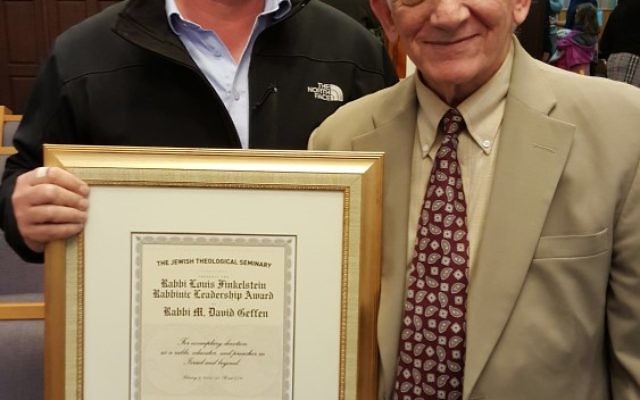Orthodox Innovation in Israel
By Rabbi David Geffen
There are hundreds, perhaps thousands, of Orthodox rabbis in Israel. Some serve congregations. Some head yeshivot. Some teach, and some just continue to study.
The Orthodox rabbinic phenomenon that I would like to describe has three faces to it.
As of August, the Ramban synagogue in the Katamon section of Jerusalem, which is led by Rabbi Benny Lau, has a rabbanit who was hired to work with the congregation. Her name is Karmit Feintuch, and she has been educational director at the Migdal Oz seminary since 2008.
Rabbi Lau, when asked, said, “Rabbanit Feintuch will deal with all aspects of the spiritual life of the community and the connection between women and men and G-d.”
This is a dramatic step forward in Israel, but it demonstrates what is happening in the country. Women are studying intensively in yeshivot set up for them. They become experts in Talmud and in halacha.
Some find communities and schools where they can teach. Others greatly desire to serve as rabbanits. Even in Israel, they are getting a chance.
There is an emphasis in many Orthodox communities throughout Israel to integrate female spiritual leadership. The emphasis is so strong that in an “Orthodox street picture to color,” a woman is standing between a Modern Orthodox individual and a more intensive Orthodox man, and all three are holding a lulav and etrog. Some 5,000 of these pictures were colored before and during Sukkot.
There are Orthodox women who want their rights. They want to pass the Torah on Shabbat and dance with the Torah on Simchat Torah. For Orthodoxy in Israel, it is a fascinating development. Who knows where it will lead?
Rabbi Lau in his spiritual, pragmatic approach said, “Karmit Feintuch is going to help our community grow bigger, sweeter and more beautiful fruit, and that is why we hired her.”
Another group of Orthodox rabbis is called Tzohar. This rabbinical grouping was created almost 25 years ago to answer the needs of Israelis — some religious, others not. The ineffectiveness of the state rabbinate of Israel to make mitzvot meaningful generated a response.
Tzohar rabbis are listed in the communities where they lived. Couples planning to get married have someone to speak to about the meaning of Jewish marriage. The rabbi meets with the couple five to 10 times, explaining the responsibilities of the husband and wife. They discuss the spiritual meaning of the intimate relationships between husband and wife. The couple learns what creating a family means and why it is so important to do so.
Special time is given to the explanation of the wedding ceremony, so that this most important religious act has deeper meaning. Each of the prayers used at the wedding is discussed, as is every symbolic act, such as a bride walking around the groom, the ring ceremony, the ketubah and the breaking of the glass. The Tzohar rabbis are committed to filling the wedding experience with meaning.
The Tzohar rabbi conducts the marriage ceremony and frequently becomes the couple’s rabbi — sometimes in a synagogue, sometimes on a personal basis.
The official rabbinate of Israel, headed by the Ashkenazi and Sephardi chief rabbis, is underwritten by the taxes of Israelis. From the beginning of the state, a bureaucratic rabbinate system was created to deal with marriages, conversions, divorces, kashrut and other aspects of Jewish religious life.
The rabbis in this system are for the most part experts in halacha, but their sensitivities to the Jewish religion are minimal. They are paid a salary to run the offices that deal with religious matters. Frequently, they are bureaucratic and indifferent to Judaism other than enforcing halacha.
Every couple to be married in Israel must get the approval of the department of religion because there is no civil marriage. This confirmation of the right to marry involves proving you are Jewish by showing your parents’ ketubah or a conversion certificate. In addition, you have to bring witnesses who have known the individuals for many years and can testify that the bride and groom are Jewish.
The Israeli rabbinate is powerful, and in terms of conversion and divorce, only certain rabbis are on the “list.”
Because Ivanka Trump was converted by the noted Rabbi Haskell Lookstein of New York, she would have problems in religious circles in Israel. The official Israeli rabbinate refuses to accept Rabbi Lookstein’s converts. Who knows why?
Divorce in Israel is also handled by the rabbinate, but it is possible to hire lawyers, conversant in Jewish marriage law, to argue the divorce rights of clients. A recent Israeli movie called “Get” (Jewish divorce) demonstrates the lack of concern at times of the rabbis making the decision to permit ending a marriage Jewishly.
Recently, the rabbinate demonstrated innovation by taking away the American passport of an Orthodox Jew who refused to influence his son in America to give his daughter-in-law in Israel a Jewish divorce. Jewish law in this instance labels the woman an agunah, who can never marry Jewishly because technically she is still married.
The Orthodox rabbis in some organizations are making the case that Israel is no longer Jewish — it is just democratic. They protest those whom they see as destroying the religious aspect of Israeli society.
No one knows what the future will be. At least certain Orthodox rabbis are trying their best to make the Jewish religion more meaningful for Israeli citizens.





comments